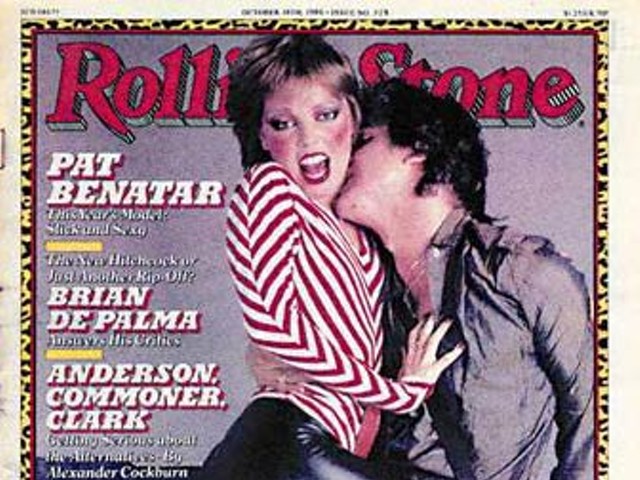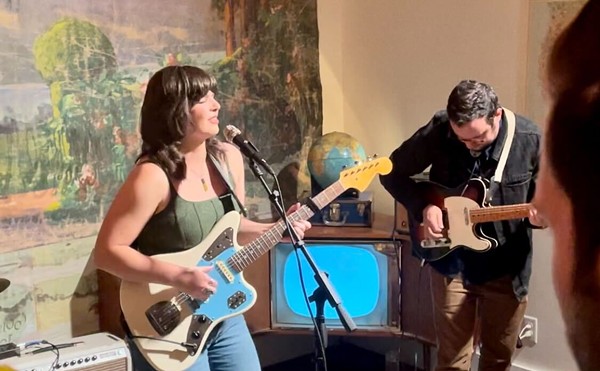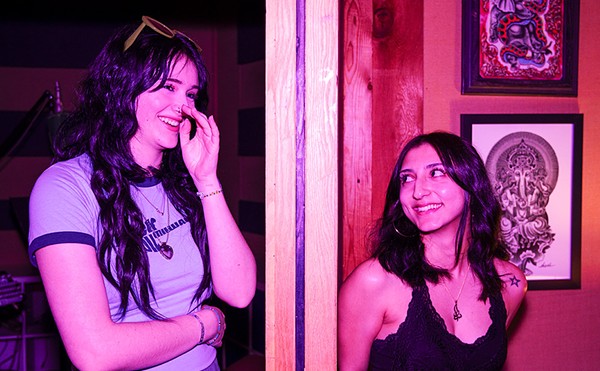I want to be a good man.
I'm trying to be a good man.
— David Bazan, 2007
The last time I spoke with David Bazan, in the fall of 2007, those words, the phrase "good man," tumbled out of his mouth repeatedly, like a mantra. Had we been speaking a decade earlier, the 34-year-old singer-songwriter instead would have probably said that his driving purpose in life was to be a "good Christian." But at that point a couple of years ago, Bazan was undergoing a monumental metamorphosis.
He'd recently pulled the plug on his long-running indie-rock outfit, Pedro the Lion. He was getting sober after an extended stretch at the bottom of the bottle, having stumbled to a place where he needed to get annihilated with booze prior to every performance (and often in his time away from the stage, too). And the biggest change of all, the one that drove him to drink heavily to deal with all the confusion and torment — he was slowly but surely abandoning the strict evangelical Christian faith in which he was raised, which he espoused and explored during his ten years fronting Pedro.
Bazan was dealing with the beginning of things, too. He and his wife were raising their first child, an infant daughter, and his solo career was just getting off the ground. He'd issued an EP in 2006, Fewer Moving Parts, and was commencing work on his debut LP.
Today, that album — Curse Your Branches — has been out for a few months, and it's garnered some of the best reviews of Bazan's career. His family is growing: He has a nine-month-old son in addition to his now-five-year-old daughter. He'll have a drink every now and again, but he won't get wrecked anymore — spurred mainly by his shame and regret over not really being present for his daughter's first couple of years. And he's gathered up four of his closest Seattle musician pals to tour the country with him. After four years of performing solo acoustic, it's the first time he's playing with a band since the end of Pedro the Lion.
But what of that chief concern about becoming a "good man"? Over the phone from outside his Seattle home, where he's prepping his tour van for the thousands of road miles to come, the affable Bazan chuckles lightly when I remind him of his words from a couple years prior. "To have that written on the mirror that I look at my face in every morning — 'I want to be a good man' — wouldn't be a bad idea."
He figures he's doing a decent enough job of it, and as he goes on to explain where his mind and heart are at right now, it's evident that he's severed ties with his old belief system. "That's not exactly the way that evangelical Christians talk about things," he says. "Being a good person isn't gonna get you to Heaven, by their estimation, and, well, that's the ultimate goal. Heaven or Hell — that's the motivation for doing everything. And because being a good person isn't gonna get you to Heaven — having faith in Jesus is the only way — being a good person isn't high on the list of things to try to be. In my estimation, evangelical Christianity doesn't actually champion the development of virtue. I know people might argue that, but I think I could hold my own in that argument.
"So there was a period where I realized that I am responsible for my life," he continues. "And whether it's gonna get me to Heaven or not, I don't care. I just need to be a good man. Now it's embedded in everything that I'm doing — developing virtuous habits and taking stock of the explicit and implicit social contracts that I have outstanding and making good on all of those things, and checking my rear-view mirror for my wake of destruction that I inevitably leave behind and trying to take responsibility for that."
The wholly autobiographical Curse Your Branches can indeed be taken as a candid and unflinching document of Bazan's divorce from Christianity. Across its ten tracks, God frequently takes a beating: "With the threat of Hell hanging over my head like a halo/I was made to believe in a couple of beautiful truths/That eventually had the effect of completely unraveling/The powerful curse put on me by you," Bazan sings in "When We Fell." In the scathing final verse of "In Stitches" he intones, "When Job asked you the question, you responded, 'Who are you to challenge your creator?'/Well, if that one part is true, it makes you sound defensive, like you had not thought it through enough to have an answer/Or you might have bit off more than you could chew."
On the title track, Bazan shakes his fist at the notion of "original sin": "Fallen leaves should curse their branches/For not letting them decide where they should fall/And not letting them refuse to fall at all." And in a handful of songs, he acknowledges the strain his departure from the church has put on the relationships with his wife and his parents (all of them still devout, and all of them hoping that he'll someday return to Jesus). In the six-minute opener, "Hard to Be," he offers a biting metaphor: "I swung my tassel to the left side of my cap/Knowing after graduation there would be no going back/And no congratulations from my faithful family/Some of whom are already fasting to intercede for me." In "Bearing Witness," meanwhile, he asserts his allegiance to a more humanistic stance: "Though it may alienate your family/And blur the lines of your identity/Let go of what you know/And honor what exists."
Still, things aren't quite so cut-and-dry for Bazan. He refers to himself as agnostic and confesses to being "double-, triple-, quadruple-minded" when it comes to the existence of God. Another verse of "In Stitches" suggests he's still haunted by remnants of the faith he's left behind: "I might as well admit it/Like I even have a choice/The crew have killed the captain/But they still can hear his voice/A shadow on the water/A whisper in the wind."
And for all of the vitriol in "When We Fell," Bazan says, "When I wrote that song, I had the real sense that there was one version of God, and it was the version of God that evangelical Christianity described. And I was speaking to that God and voicing dissatisfaction with that character. And in the wake of that, it was like, 'That's just what they say he is, and I'm speaking to that God.' So occasionally, if I'm feeling close to a notion that there is a God and he's not like that, when I sing that song I feel like I'm defending God. There's a sense in which I feel like I'm tearing down one version of God and maybe going to bat for the God that might actually exist."
It's important to note that Curse Your Branches is not an episode of Lost — you don't necessarily need to know the religious back story to find a way in. It's also easy to fall in love with on an aesthetic level. That's part of what drew so many secular music fans to Pedro the Lion: Aside from Bazan's willingness to question his faith in Pedro lyrics rather than promote strict dogma (though in the end, he always insisted he believed), it was his commitment to artfully constructed, melodically rich music that distinguished the band from a "Christian-rock" scene that overwhelmingly prized the message over a good tune.
On Branches, Bazan stretches out vocally like never before. His expressive, wide-ranging voice — simultaneously sweet and weighty as always — nails an even wider spectrum of emotions: anger, grief, shame, resolve, relief. And sonic pleasures both grand and subtle, uplifting and shattering, pour out from start to finish. The way a lonely, yearning piano melody intertwines with synthesizer and drums to form the lush, regal foundation of "Hard To Be." The breezy guitar twang of "Bearing Witness," which plays off the texture and swing of Stealers Wheel's "Stuck in the Middle With You." The molasses, hymnlike convergence of organ, pedal steel and percussion that deftly underscores and subverts the lyrical concerns of "In Stitches."
Part of being a "good man," Bazan explains, is also striving to be the best artist and the best performer he can possibly be. Proud of his growth as a singer and a songwriter, he's itching to get back into the clubs with a band after more than a year of performing intimate, solo "living room shows" — online-organized gigs in people's houses where he's played his songs for a few dozen fans and answered all of their questions, typically deep and difficult ones, typically about his faith or lack thereof. Clearly, Bazan the person and Bazan the artist will always be associated with matters of Christianity, no matter what direction he pushes his career from here. But he seems OK with that and at peace with the direction he's pushed his life.
"When I was a kid we moved around a bunch, and the first time we did, my whole world came apart in my mind. I just felt like, you know, 'What happened to all my friends?!' and so on," he says. "But after doing it three years in a row, it was like, 'This isn't so bad — I'm still here, and things are OK.' So it's the same kinda thing.
"You lose your sense of bearings in regard to all of these issues for a bit, and you feel like everything should be broken, but it's not. And then you just kinda move forward. It's like, well, I'm still standing and I'm in love with my wife and my kids are growing up well and I feel good about myself and I'm happy with the music that I'm making. To quote The Big Lebowski, as I am often compelled to do: 'Nothing is fucked here.'"





